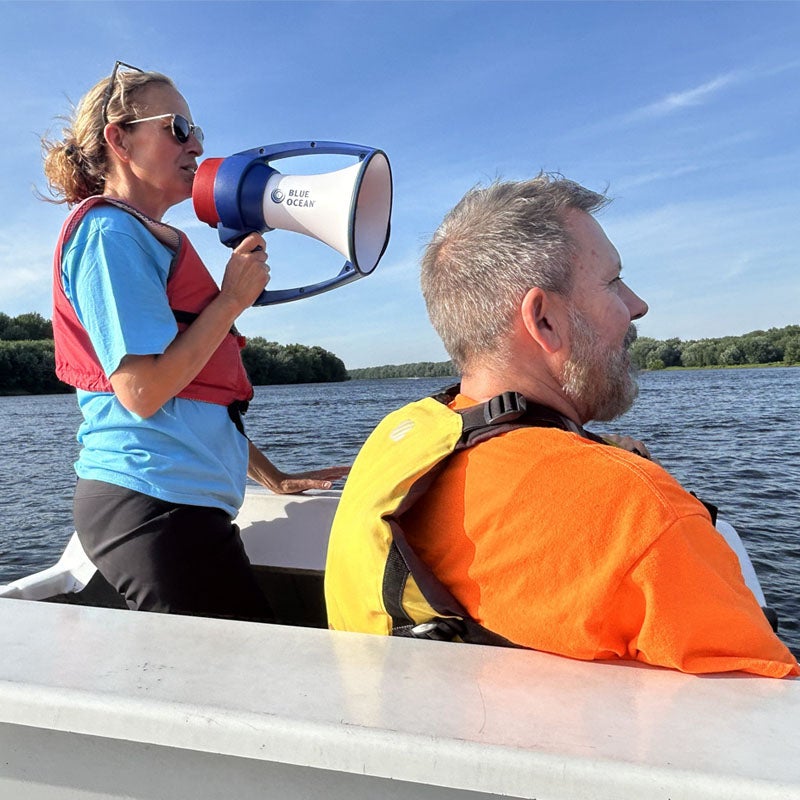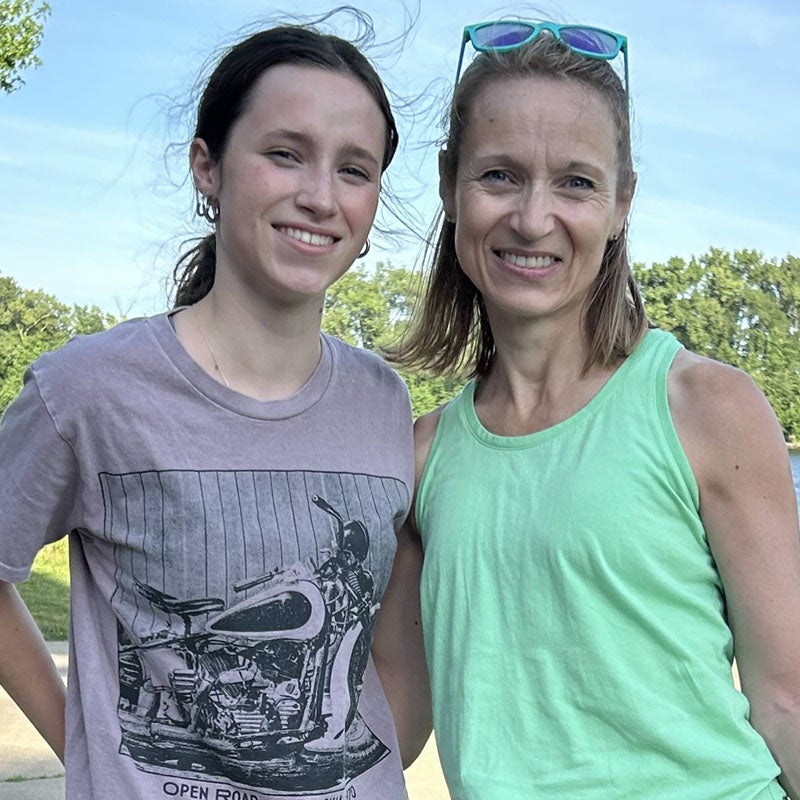Your Stories: Saint Francis Auxiliary Gift Supports Connecticut’s First Adaptive Rowing Program
August 16, 2024Categories: Colleague Corner
At the monthly board meeting of the Saint Francis Hospital Auxiliary on June 12, 2024, Susan Joyse, vice president of the organization, presented gifts totaling $21,000 to four hospital departments. These support the ongoing needs of providing quality healthcare to the patients within each area.

Paige McCullough Casciano, Mount Sinai Rehabilitation Therapist and co-founder of the Connecticut Adaptive Rowing Program, coaches a participant along with volunteer Brian Wendry.
Gift recipients are chosen in a collaboration with the Saint Francis Hospital Foundation, Sue notes. “Each year, we ask the Foundation to help us identify ways to financially support the needs of various departments at Saint Francis and Mount Sinai. These are in addition to the major gifts that the Auxiliary pledges to hospital campaigns and other large hospital investments.”
This year, one of the awards for $5,000 went to Mount Sinai Rehabilitation Hospital to support safety equipment for the Connecticut Adaptive Rowing Program (CARP), which provides free kayaking and rowing opportunities for disabled or visually impaired patients.
Paige McCullough-Casciano, recreation therapist at Mount Sinai since 1997 and a co-founder of the program, remembers the moment she received news of this gift. “I was at my desk catching up on emails and I opened one from Auxiliary President Ranjana Chawla. My jaw literally dropped. Five thousand dollars! We struggle, sometimes, to get a grant of $500. But $5,000! This meant that we could upgrade some of our safety gear, which is essential. When you are on the water, working with people, some of whom don’t swim—or can’t swim anymore—safety is at the top of the list. Our program, our participants, rely on us to have enough equipment and the safest equipment to meet the needs of every individual to have a wonderful experience on the water.”
Concern for safety, as well as the desire to provide a rewarding recreational activity in a natural setting, was at the heart of the program’s inception nearly two decades ago. The program grew out of discussions in the Mount Sinai support group for individuals with spinal cord injuries, which Paige was coordinating.
“Water sports was a recurring theme. They wanted to get back on the water, to be out in nature,” she recalls. “We asked, ‘What do you want to do on the water?’ The group said, ‘We’d really like to try kayaking.’”
“Remember, this was 20 years ago,” Paige notes. “People didn’t think about adaptive measures the way we do now. Even getting therapy dogs to come in—‘Dogs in a hospital?’— was a new concept.” She laughs as she recalls the start of that program. So, back then, she and Joan Karpak, the Mount Sinai physical therapist who had rowed as an undergrad at the University of Pennsylvania, began some serious research into the endeavor.
The two colleagues traveled to the Philadelphia Rowing Program for the Disabled, where adaptive rowing started in 1980. “We told them we have people who want to kayak, and we’re not feeling as confident at this point about single boats. We want to consider rowing as a safer option. And they were fabulous. They showed us equipment, they told us about their program; they gave us so much information. We came back and put a proposal together. We had met with Riverfront Recapture prior to going and we wrote a grant to the Dana and Christopher Reeve Foundation, who were instrumental in helping us obtain the first batch of equipment—which we still use today; we’ve been able to keep it going.”
In 2003 Paige and Joan sat around the board table at Riverfront Recapture with longtime CEO Joe Marfuggi (now deceased) and then Rowing Director Brian Wendry.
“They were on board, 100 percent: ‘Let’s do it; what do you need from us?’” recalls Paige, who notes that CARP became the first adaptive community rowing program in the state. “From there we just started pulling pieces together and we offered adaptive rowing with three people a session; that was it, starting out. And years and years later, here we are. We’ve expanded the program. It’s now not just people for with spinal cord injuries, it’s for individuals with physical disabilities and/or visual impairments. Those are the people we serve at Mount Sinai, primarily, so we wanted to stay under our umbrella, our knowledge, and accreditation.
“Now, we’ve also expanded from rowing to also offering adaptive kayaking, circling back to the initial idea. Another offshoot is our Veterans Initiative: we offer kayaking and rowing lessons for veterans and military service members as a thank you on Saturday mornings. And we have the ability to adapt for people with limb loss or PTSD. We offer people a chance to be in nature and develop a sense of camaraderie.”
On a recent Wednesday evening at Riverfront Park, the dock and boat launch area were bustling with people carrying oars, gathering in groups to chat, and putting on lifejackets that had been laid out along a wall. Rowers and volunteers mingle, chat, and laugh. The ease, along with the sense of belonging to and ownership of the program, is palpable.
Katie Bailey, survivor of a sudden cardiac arrest event more than a decade ago, prepared to take her seat in a two-person scull behind a volunteer, just as she’s been doing for eight years. “I lost the ability to swim,” she says. “I thought I’d never be on the water again. And then I came here, and it’s changed everything. Now I can experience the water every week. And the camaraderie of this group is outstanding.”
While Katie rows, her daughter, Payton, a sophomore at Conard High School, rides in the back seat of the launch driven by Brian Wendry, now a professor of Sport Management at Nichols College. Payton has been coming to the program with her mother “since I was little,” she says, and has recently taken on a more active volunteer role, setting out equipment and later hosing off the sculls and kayaks, carrying them on her shoulders and putting them away.
College. Payton has been coming to the program with her mother “since I was little,” she says, and has recently taken on a more active volunteer role, setting out equipment and later hosing off the sculls and kayaks, carrying them on her shoulders and putting them away.
Brian returns every Wednesday night for adaptive rowing and Saturday mornings, when veterans are invited to row, to power the launch across the river, looping between all boats as a safety check, as well as offering pointers and troubleshooting.
“I had to come back to Riverfront and help with CARP,” says Brian, who volunteers his time. “Paige is amazing; she’s a force of nature. She does everything. You want to work with a person like that.” In a few minutes, he circles back to the dock and Paige hops in, taking the seat beside him. The two catch up on what they’ve observed about this evening’s participants and began another loop around the river. They check on a kayaker who seems close to the shore (all is well); offer guidance about going under a bridge; coach a rower on style; and then head off an overly ambitious kayaker paddling towards a distant bridge out of sight.
Asked about the program, Paige praises the volunteers. “I’m so blessed to have amazing, dedicated, knowledgeable, and supportive volunteers, because I can’t run the program alone. There are too many moving parts, I need people physically in place in each area we’re working.”
She also admires the participants and talks about the amazing people who have come through the program and acknowledges the sense of responsibility that drives her. “Last week, when we were out with the veteran’s group, I asked one person, ‘How are you doing?’ and she said, ‘This is amazing. We need more of this. I need more of this.’ I could see the deep relaxation in her body language, I could see a centering of peace as she sat there on the water in her single kayak, in joy. That’s a lot of what we want to bring to people and that’s a lot of what people have to gain from this program: being in nature, with the wind, the sun, the water.
“There was a waiting list this past Saturday, which I felt really bad about, that we couldn’t accommodate everyone. But I will work toward getting a few more kayaks, because I don’t want to turn away anyone who feels they need to be here.
“You never know which is the most important program to someone, the one that keeps them moving forward. I want us to be here for everyone who needs us.”
Submitted by Cynthia Rockwell, Saint Francis Auxiliary.
Have a story you want to share? Submit your story at TrinityHealthOfNE.org/YourStories.
